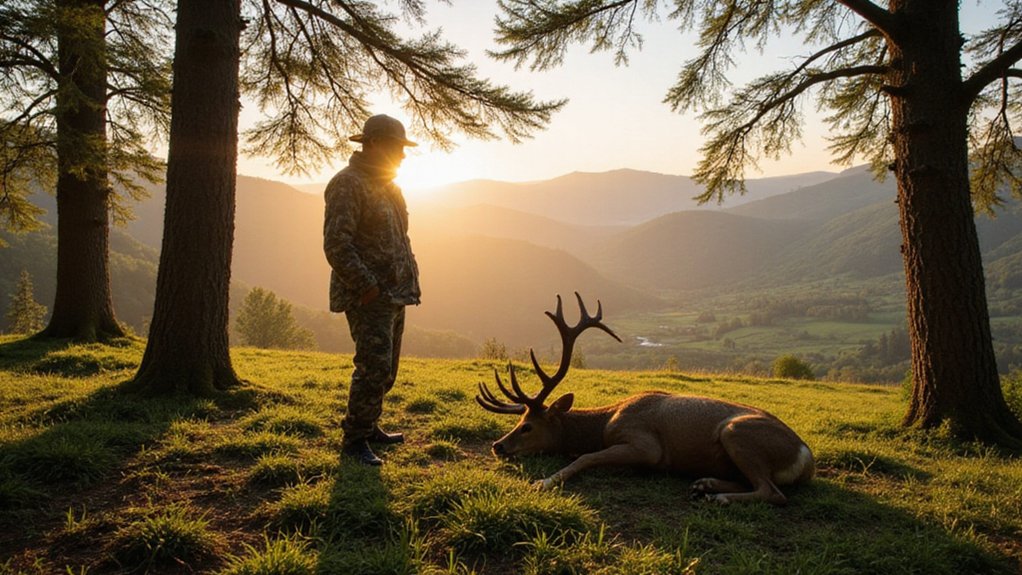Hunting economics plays a vital role in balancing wildlife conservation and local economies. It affects how game species are valued and how regulations are shaped. As you explore this topic, you’ll see how supply and demand impact pricing and community benefits. But what happens when the economic interests of hunting collide with conservation goals? Understanding this dynamic could change your perspective on wildlife management.
What is Hunting Economics and Why Does It Matter?
Hunting economics examines the financial and ecological impacts of hunting activities on both local and global scales.
It matters because understanding these impacts helps you make informed decisions about wildlife conservation, resource management, and community development. By analyzing hunting’s economic benefits—like job creation, tourism revenue, and funding for conservation efforts—you can appreciate its role in sustaining ecosystems.
Furthermore, recognizing the ecological consequences guarantees that hunting practices promote biodiversity and habitat preservation.
Ultimately, grasping hunting economics equips you to advocate for responsible practices that balance human interests with environmental stewardship, fostering a healthier relationship with nature.
How Do Supply and Demand Affect Hunting Economics?
Understanding the economic principles of supply and demand is key to grasping the complexities of hunting economics. When demand for game species rises, hunters are more willing to pay for permits and licenses, driving up prices.
Conversely, if an animal population declines, supply diminishes, which can lead to stricter regulations and increased costs. Seasonal factors also play a role; during peak hunting seasons, demand surges.
This interplay influences not only hunting costs but also conservation efforts, as higher demand can fund wildlife management. Ultimately, a balanced understanding of supply and demand helps you navigate the hunting landscape effectively.
What Are the Economic Benefits of Hunting for Local Communities?
While some may view hunting solely as a recreational activity, it also brings significant economic benefits to local communities.
When you participate in hunting, you’re not just enjoying nature; you’re contributing to local economies. Hunters spend money on gear, licenses, and travel, which supports local businesses like shops, hotels, and restaurants.
Additionally, hunting creates jobs in guiding, outfitting, and conservation efforts. The revenue generated can help fund local infrastructure and wildlife management programs, ensuring the natural environment thrives.
Why Is Hunting Considered a Sustainable Economic Activity?
How does hunting align with principles of sustainability?
Hunting promotes balanced ecosystems by managing animal populations. When you hunt responsibly, you’re helping prevent overpopulation, which can lead to habitat destruction.
Additionally, hunting encourages land conservation; many hunters support initiatives that protect natural habitats. This creates a win-win situation: wildlife thrives, and you enjoy the benefits of sustainable practices.
Moreover, hunting generates economic activity through local businesses, providing jobs and funding for conservation efforts.
How Do Hunting Licenses and Fees Contribute to Wildlife Conservation?
Many people mightn’t realize that hunting licenses and fees play an essential role in wildlife conservation.
When you purchase a hunting license, your money directly supports programs aimed at protecting habitats and managing wildlife populations. These fees help fund essential research, habitat restoration, and enforcement of wildlife laws.
Additionally, they contribute to educational programs that promote responsible hunting practices. By participating in hunting, you’re not just enjoying the outdoors; you’re actively supporting efforts that guarantee sustainable ecosystems.
What Role Do Hunters Play in Funding Conservation Efforts?
Hunters play an essential role in funding conservation efforts, as their participation directly channels resources into protecting and managing wildlife.
When you purchase licenses and permits, you’re contributing to state and federal programs dedicated to habitat restoration, species monitoring, and conservation education.
Additionally, many hunters support non-profit organizations focused on wildlife preservation. Your involvement helps fund critical projects, ensuring ecosystems remain balanced and healthy.
This financial backing not only protects wildlife but also enhances outdoor recreational opportunities.
How Can Hunting Economics Influence Wildlife Management Policies?
While balancing wildlife populations and ecosystem health can be challenging, hunting economics substantially shapes wildlife management policies.
The revenue generated from hunting licenses and fees often directs conservation efforts and management strategies. This influence can lead to:
- Increased funding for habitat restoration
- Implementation of regulated hunting seasons
- Enhanced research on species populations
- Development of public education programs
- Better collaboration with local communities
What Are the Future Trends in Hunting Economics?
As the landscape of hunting continues to evolve, emerging trends in hunting economics are likely to reshape the future of both wildlife management and recreational practices.
You’ll notice a growing emphasis on sustainable hunting practices, driven by consumer demand for ethical and eco-friendly experiences.
Technological advancements, like smart tracking devices, will enhance efficiency and safety in hunting.
Additionally, the rise of virtual hunting experiences could attract new participants, expanding the market.
Finally, as conservation funding relies more on hunting revenues, you’ll see increased collaboration between hunters and wildlife organizations, fostering a shared responsibility for ecosystem health and biodiversity.
